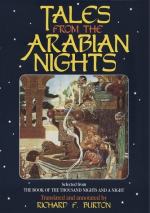Against such lack of knowledge my notes are a protest; and I may claim success despite the difficulty of the task. A traveller familiar with Syria and Palestine, Herr Landberg, writes, “La plume refuserait son service, la langue serait insuffisante, si celui qui connait la vie de tous les jours des Orientaux, surtout des classes elevees, voulait la devoiler. L’Europe est bien loin d’en avoir la moindre idee.”
In this matter I have done my best, at a time too when the hapless English traveller is expected to write like a young lady for young ladies, and never to notice what underlies the most superficial stratum. And I also maintain that the free treatment of topics usually taboo’d and held to be “alekta”—unknown and unfitted for publicity—will be a national benefit to an “Empire of Opinion,” whose very basis and buttresses are a thorough knowledge by the rulers of the ruled. Men have been crowned with gold in the Capitol for lesser services rendered to the Respublica.
That the work contains errors, shortcomings and many a lapsus, I am the first and foremost to declare. Yet in justice to myself I must also notice that the maculae are few and far between; even the most unfriendly and interested critics have failed to point out an abnormal number of slips. And before pronouncing the “Vos plaudite!” or, as Easterns more politely say, “I implore that my poor name may be raised aloft on the tongue of praise,” let me invoke the fair field and courteous favour which the Persian poet expected from his readers.
(Veil
it, an fault thou find, nor jibe nor jeer:—
None
may be found of faults and failings clear!)
Richard F. Burton.
Athenaeum Club, September 30, ’86.
Appendix
Memorandum
I make no apology for the number and extent of bibliographical and other lists given in this Appendix: they may cumber the book but they are necessary to complete my design. This has been to supply throughout the ten volumes the young Arabist and student of Orientalism and Anthropology with such assistance as I can render him; and it is my conviction that if with the aid of this version he will master the original text of the “Thousand Nights and a Night,” he will find himself at home amongst educated men in Egypt and Syria, Najd and Mesopotamia, and be able to converse with them like a gentleman; not, as too often happens in Anglo-India, like a “Ghorawala” (groom). With this object he will learn by heart what instinct and inclination suggest of the proverbs and instances, the verses, the jeux d’esprit and especially the Koranic citations scattered about the text; and my indices will enable him to hunt up the tale or the verses which he may require for quotation wven when writing an ordinary letter to a “native” correspondent. Thus he will be spared the wasted labour of wading through volumes in order to pick up a line.




